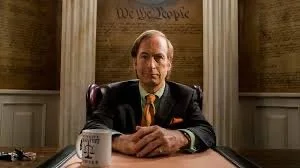Is Better Call Saul A Better Show Than Breaking Bad?
Better Call Saul having finally ended, a Breaking Bad Universe-sized hole is left in the place where my heart used to be. After two series and a movie, and nearly 15 years of content, I was itching for more. So, naturally, I went back to rewatch both series. To be completely honest, Better Call Saul, the story of a crooked attorney, seemed at first like it would be intensely boring. I didn’t trust that the character was dimensional enough to have his own show. On my first watch, my opinion didn't change much. Through my rewatch, however, something changed; where at first I had thought Better Call Saul to be slower, more unnecessary, and less exciting than Breaking Bad, I started to wonder which show really is better: the original or the spin-off? Now that both shows are finished the question can be asked and answered.
Yes, I’m really going there. Is it possible that Better Call Saul, the spinoff of what some people consider to be one of, if not THEE best show of all time? Let’s dive in.
Breaking Bad
Breaking Bad is undoubtedly an amazing show. Walter Hartwell White’s cancer diagnosis leads him to realize he’s living a dull life of unrealized potential. We can all relate to being unsatisfied with ourselves and working to improve things. Walt, however, immediately begins cooking meth and the story progresses quickly into an exciting crime drama where every moment is riddled with tension and anticipation. Part of what makes Breaking Bad great is the shock of watching a seemingly normal (at first) man cross line after line he never imagined even looking at a few months prior. The audience is on the seat of their chair through every deal, scheme, lie, murder, and ego trip, wondering what will happen next. Not to mention the use of color, the cinematography, the incredible dialogue, the (mostly) accurate science, and the incredible dynamic with former student turned sidekick, Jesse Pinkman.
The main thing, in my opinion, that makes this show so fantastic, is the blurred line between protagonist and antagonist. It’s almost like they want to see just how long the audience will excuse Walt’s actions before they get that he may not be the person that we should be rooting for.
Better Call Saul
Better Call Saul centers around Jimmy McGill, who will eventually become the criminal lawyer Saul Goodman that we all know and love. When we start the series, McGill is a public defender with a slightly troubled past trying desperately to make a name for himself the right way. The show is different fundamentally from its predecessor; it lacks the anticipation and urgency that Breaking Bad has from the pilot. What the spinoff has that the original doesn’t, however, greatly makes up for it.
Better Call Saul takes its time in establishing every single character and garnering audience sympathy. What takes place is a slow battle between Saul’s good and not-so-good side (in light similarty to Walter White) as he struggles with his conditioning, the expectations of others, and his own ambition. It’s a human condition the audience can attach itself to even more so than Walter White’s arc. That, Saul’s charisma, and the momentum from Breaking Bad help make a spinoff a powerful television series.
The catch? We know the ending. We get to cringe through every bad decision and wonder if Saul/Jimmy will ever get it right. In my own opinion, this is where BCS exceeds expectations: the emotional pull of inevitability and the possibility for redemption.
The Storylines
Breaking Bad mined drama from the quick descent of Walter White into darkness, and though we knew of his life before his fateful cancer diagnosis, the show pretty much establishes the more egotistical and selfish traits Walt carries with him from episode one. In contrast, Better Call Saul, had a more challenging task; to show the rationalization and descent of a person with a good heart who we had already seen at his climax. We already know who Saul becomes and so the ride there has to be extra convincing and well-paced.
Unlike Walter, who jumps straight to criminal activity, McGill listens to the angel on his shoulder, or at least he wants to listen. You get the sense that the show is more of a redemption story, something that can’t be said of Breaking Bad. While Better Call Saul begins with a seemingly upbeat story, we see both characters cross lines in their future as well as their past, giving the show a feeling of inevitability. Whereas with Walt’s transition we felt shock, the feeling of inevitability in the spinoff is much stronger. It’s sad, it's foreboding, but it's gripping. Like watching a train wreck; you can’t look away. Better Call Saul leans into this feeling of dissonance, creating a strong emotional reaction because the audience is already attached to, and aware of the fate of, both characters.
Jimmy is a good lawyer. But he’s a great con-artist. Every time he tries to succeed without bending the rules he’s almost punished. Things don’t turn out right, he can’t support himself and his brother, and he’s looked down upon by the law community. But when he uses his sordid talents to the best of his ability it’s win after win after win. And with that in mind—plus Chuck's constant undermining—it’s no wonder he turns from a criminal lawyer into a ‘criminal’ lawyer. His own brother—the person who he looks up to the most—said it himself, “he’ll never change.”
A self-fulfilling prophecy at work.
At the same time that we see Jimmy/Saul sliding downward into what will become a life full of crime and regret, we see the same man, now Gene Takovic, struggling once again to live a normal life in an honest-to-goodness story of redemption. Here, especially towards the end, we see a man who was supposedly doomed to a fate of criminality, let everything go in order to save something he loves. And after everything Saul and Gene go through, Saul eventually becomes Jimmy again.
The story that teaches us; we are more than others say we are… we can be more than we are meant to be.
The Payoff, or Lack Thereof
Breaking Bad has its own emotional push and pull. The weight of what Walt’s doing on the daily, leading to the destruction of the family he tried so hard to provide for, the father-son dynamic between him and Jesse, the excitement the audience feels when Walter thinks of some amazing and science-y way to save both of their lives, and the feeling of dread as he falls deeper into his own narcissism. It’s a lot of weight. There’s also something to be said for the irony embedded in the show; particularly in how he leaves nothing to his wife and kids, how he is unable to die before the consequences of his actions are realized.
Both shows have their merits and which one is a better story is ultimately a matter of opinion. I’d imagine a lot of it has to do with the viewer: whether they prefer fast paced crime dramas or slow paced character-focused legal dramas. My opinion, and I’m ready to be yelled at for it, is that I really think Better Call Saul surpassed its source material. With Breaking Bad we have only Walter’s downward spiral but in BCS we experience the roller coaster with the characters as they fight - and sometimes lose to - the very nature of who they are. Inevitability lends so much intense power to show that even with slower pacing it is more emotionally effective than Breaking Bad. We get to see what Saul lost in Jimmy McGill (mirrored by our own self image and what we’ve lost of ourselves) and how he gained it back. in doing so - we get the sense that we, too, can be redeemed and become better versions of ourselves.
Agree? Disagree? Go to the gram to comment!














